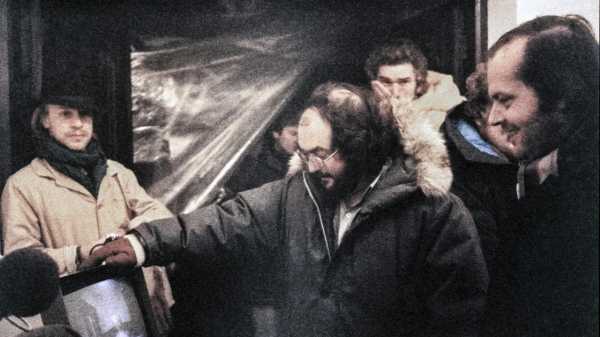
Some of the most iconic moments, scenes, and performances in the modern cinema were created by Stanley Kubrick, but several of them wouldn’t have been created—at least, not in the same way—if it weren’t for the effort and the sensibility of Kubrick’s longtime right-hand man, Leon Vitali. Vitali, who is the subject of Tony Zierra’s documentary portrait “Filmworker,” opening this Friday, was a drama-school student, in London in the late nineteen-sixties, when he first saw “2001: A Space Odyssey”; he deemed it the greatest movie he’d ever seen. Soon thereafter, he saw “A Clockwork Orange” and admired the extravagant performances that Kubrick elicited from his actors. Vitali told himself, “I want to work for that man,” and that desire—along with the cinematic ideas and ideals that fuel it—is the main subject of “Filmworker.”
Vitali’s propulsion into Kubrick’s orbit took place via a remarkable blend of happenstance and design. Vitali’s agent got him an audition for a role in “Barry Lyndon,” and he got the part of Lord Bullingdon, which he threw himself into with devotion. He was rewarded by Kubrick with an amplified role and was fascinated to watch Kubrick and the huge crew work. He expressed to Kubrick his desire to work with him behind the scenes, and was advised by Kubrick to get some experience and then get back to him. After a stint volunteering in the editing room of a Swedish Frankenstein movie in which he starred, Vitali got back in touch with Kubrick, who sent him a copy of Stephen King’s “The Shining” and asked what he thought of it. Vitali told Kubrick that he thought it would make a terrific film; Kubrick—who lived in England—asked Vitali if he’d like to travel to the United States in search of a child actor to play the role of Danny. From that assignment grew a career, or a calling—Vitali, who is now sixty-nine, put aside his acting career and worked exclusively with Kubrick until the end of the director’s life (he died in 1998, soon after he finished editing “Eyes Wide Shut”) and then continued to work on Kubrick’s film, and on his artistic legacy, even after his passing.
“Filmworker” is a heavily front-loaded film, with its most vivid and most significant stories emerging in the first half hour, which chronicles Vitali’s contributions to “The Shining” and “Full Metal Jacket.” He travelled to many Midwestern cities in search of a child actor to play Danny in the adaptation of King’s novel and auditioned, he said, four thousand children. One of them, Danny Lloyd, who was part of the largest group of aspirants, in Chicago, was a reluctant presence; now in his forties, Lloyd recalls the process, together with Vitali, who gently, firmly, warmly, jovially coaxed the boy out of his shell and thereby formed an immediate bond with him—with the result that, once Lloyd was cast, Vitali was his virtually constant on-set companion and unofficial acting coach. Then, for “Full Metal Jacket,” Vitali again worked on casting, and was integral to the selection of R. Lee Ermey to play the drill instructor (Zierra’s interview with the late Ermey is among the highlights of “Filmworker”). After Ermey was cast, Vitali helped Kubrick to compose Ermey’s taped improvisations into scripted dialogue and worked at length with him as an acting coach.
Meanwhile, Kubrick’s own manner, calmer during the making of “The Shining,” turned dark and stormy during the more physically challenging shoot of “Full Metal Jacket,” and Vitali wasn’t the only member of the troupe to bear the brunt of Kubrick’s temperament. (One designer is said to have had a nervous breakdown in the course of the filming).
Kubrick relied on Vitali as a factotum; he taught and encouraged Vitali to take on a wide range of responsibilities, and only some of them involved on-set and behind-the-camera film production (notably, sound effects). Moreover, Vitali became a sort of recording angel who, following Kubrick’s instructions, took copious notes on whatever they were working on—and much of what they were working on was office correspondence and negotiations about the advertising and promotion of Kubrick’s films, the marketing, releasing, archiving, and preservation of them, and also their revival. Kubrick oversaw every aspect of his films, even long after their completion, with obsessively demanding precision, and Vitali did much of the legwork, the detail-hunting, the interrogating, the organizing. The last hour of “Filmworker” is centered largely on this mountain of peripheral activities, which left its trace in the boxes of papers that Vitali has collected and the archive of film materials that he has compiled and catalogued.
What emerges, in Zierra’s portrait of Vitali, is that Kubrick didn’t so much drive Vitali as merely pile his requests and his expectations upon Vitali, who, in turn, was so devoted to Kubrick and his art that he did whatever was needed to fulfill those responsibilities. Vitali worked fourteen or more hours a day, seven days a week; Vitali’s children, interviewed in the film, have warm reminiscences of Kubrick himself but recall that their father was always more present and available for the director than he was for them. Matthew Modine, one of the stars of “Full Metal Jacket,” recalls, “What Leon did was a selfless act, a kind of crucifixion of himself.” Vitali remembers passing through the gates to Kubrick’s estate, seeing the gates close behind him, and saying to himself, “This is it: there will be no ‘you’ until you start driving out of here at some point.” Vitali also tells Zierra, “I have a need for creativity, I’m obsessed with it. . . . I’m at his service; he’s at the service of his movie.”
What “Filmworker” does, albeit incidentally and unawares, is to raise questions about the nature of Kubrick’s creativity. One of the movie’s interview subjects, Lisa Leone, rightly notes that the lists of names in a movie’s end credits are “all a bunch of Leons,” all essential participants without whose involvement the movie wouldn’t be what it is. Which is to say that the implicit question of “Filmworker” is a very big one: What is a movie, and what is a Kubrick film? The control that Kubrick exerts over his films—and, even more, the myth of that control as the exemplary and supreme mode of movie direction, and also the self-mythologizing that Kubrick extends throughout his cinematic universe—is in fact his most distinctive and most original creation. It’s an idea that extends from the content of the movies themselves to the particulars of their release, and even includes their marketing and distribution—the very idea that there is an optimal film, one that bears the total imprint of the total intentions of the absolutely domineering and visionary director, and that there’s a platonic form of those intentions that the finished film (and even its presentation) are meant to realize.
This image of Kubrick’s aesthetic control is a ready-made parody of the art of directing. Vitali dismisses obsessive fan-theorists responsible for the “Room 237” speculations regarding the recondite but intended semiology of infinitesimal elements of “The Shining.” Yet it’s exactly that illusion, of scientifically embedded meaning and totally realized intentions, that “Filmworker” accepts without question. Despite the rueful tone with which the movie charts the sacrifices of time, family life, autonomy, and personality that Vitali made on behalf of Kubrick, Vitali himself expresses no regrets in the course of the film—and Zierra is even less critical. As a result, “Filmworker” amounts to yet another rite of devotion in the ongoing cult of Kubrick—a cult that worked its power not just on Vitali but on all of modern cinema.
Sourse: newyorker.com






